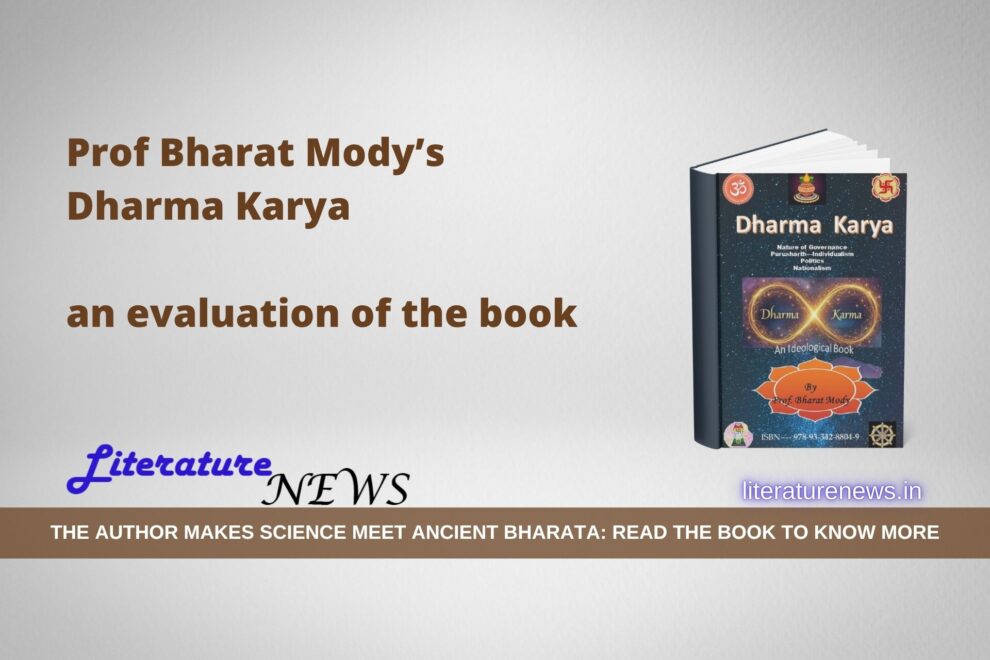The horizon of Bharat-centric literature has, in the past few decades, witnessed a renewed vitality marked by an urgent search for intellectual autonomy and civilisational self-definition. Against the backdrop of colonial legacies, imported political systems, and ideologies borrowed from the West, contemporary Indian scholarship is increasingly striving to recover its roots in indigenous knowledge systems and to reassert Bharat as a civilizational entity rather than a mere nation-state. It is in this larger intellectual movement that Prof. Bharat M. Mody’s DHARMA KARYA: An Ideological Book situates itself with remarkable boldness. Unlike conventional works that either romanticise the past or merely critique the present, this text attempts something far more ambitious: it offers a comprehensive ideological blueprint grounded in Sanatan Dharma, envisioned not as a static religious tradition but as a living, dynamic, and universally relevant system of thought.
By weaving together philosophy, politics, economics, education, and healthcare into a single ideological framework, the book positions itself as both a critique and a corrective. It challenges the received wisdom of post-independence India—its Constitution, its leadership, its educational system—and insists that Bharat’s crises of governance, morality, and identity stem not from material limitations but from a flawed ideological foundation. In this sense, DHARMA KARYA does not merely belong to the genre of socio-political literature; it belongs to the unfolding tradition of civilisational manifestos, works that seek to reorient Bharat’s trajectory by grounding it in its own philosophical ethos. The text thus asserts itself as a bold contribution to Bharat-centric literature, not content with cultural nostalgia but determined to shape the future through the prism of civilisational selfhood.
1. Reclaiming Indigenous Intellectual Authority
The book positions itself as part of a broader intellectual movement that seeks to reclaim Bharat’s civilisational agency from the shadow of colonial, Western, and Nehruvian paradigms. Prof. Bharat M. Mody critiques the colonial imprints on the Constitution, the adoption of Western economic models, and the Gandhian-Nehruvian ideological framework, which, in his view, diluted India’s civilizational essence. By foregrounding Sanatan Dharma as both philosophical grounding and practical guide, the book realigns the centre of intellectual gravity towards Bharat’s own epistemic traditions. This places it within the line of thinkers who argue for a return to indigenous frameworks—figures as varied as Swami Vivekananda, Sri Aurobindo, Deendayal Upadhyaya, and Dharampal.
2. Sanatan Dharma as a Knowledge System
Where much of post-independence literature often frames Dharma in devotional or spiritual terms, this book distinctly situates Sanatan Dharma as a “knowledge system” capable of guiding economics, politics, jurisprudence, and education. The text argues that Dharma is not a sectarian religion but a universal principle of order, responsibility, and ethical living. This repositioning transforms Dharma into a civilisational ideology, not merely a cultural artefact. On this horizon, DHARMA KARYA challenges the dominance of secular-nationalist and Marxist interpretations of India, seeking instead to reinsert Dharma as the axis of Bharat’s identity.
3. Alternative Political Blueprint
One of the most striking aspects of this book is its positioning as a political manifesto with civilisational roots. By proposing a Direct Political Republic and advocating reforms such as an indigenous Constitution, rationalised citizenship policies, and Dharma-centric governance, the book aims to offer a Bharat-specific model of polity, in contrast to the Westminster parliamentary structure inherited at independence. Such a model is neither derivative of Western liberal democracies nor aligned with socialist models. Instead, it is a civilisational experiment that envisions Bharat as a guiding light for global governance, comparable to the ideal of Ram Rajya. This ambition situates the book firmly within Bharat-centric political literature.
4. Integration of Economics and Ethics
On the economic front, the book uniquely synthesises Laissez-Faire Capitalism with Purusharth ethics. By doing so, it resists both the Nehruvian-socialist framework and unbridled Western capitalism, carving out a space for a Bharatiya model of economics grounded in human goals—Dharma, Karma, Kama, and Arth. Such integration is rare in Indian political writing, which usually oscillates between socialist and capitalist tendencies. Here, the economic vision is deeply tied to civilisational ethics, reinforcing the idea that Bharat’s path cannot simply be borrowed but must emerge from its own ethos.
5. Critique of Postcolonial India
In its critique of Gandhi, Nehru, and the judiciary, the book consciously positions itself against mainstream nationalist historiography. It identifies 15 August 1947 not as a moment of complete independence but as the continuation of flawed ideological dominance, only with Indian leaders at the helm. Such a stance challenges celebratory narratives of the freedom struggle, thereby aligning with a stream of revisionist Bharat-centric scholarship that interrogates the compromises of decolonisation. This revisionist position is provocative, but it allows the book to assert itself as counter-narrative literature, one that refuses to sacralise modern Indian political history.
6. Education and Civilisational Continuity
The book also firmly situates itself in Bharat-centric discourse by advocating for the revival of Gurukul education and an overhaul of the modern system inherited from Macaulay. This is not merely a nostalgic invocation but a civilisational claim—that education in Bharat must once again be rooted in Dharma, holistic development, and experiential learning, rather than rote-based, examination-driven patterns. This positions the text within the broader debate on decolonising Indian education, an urgent discourse in Bharat-centric literature.
7. Global Positioning through Civilisational Identity
Interestingly, the book does not restrict itself to an inward-looking vision. By claiming that Sanatan Dharma offers solutions to global crises—whether in healthcare through Ayurveda, in governance through Dharma, or in human development through Purusharth—the text positions Bharat as a civilizational leader on the world stage. This aligns it with global Hindu and Indic scholarship that seeks to universalise Bharat’s traditions not as cultural relics but as living, exportable philosophies. In this sense, the book positions Bharat not as a passive imitator of the West but as an ideological exporter.
8. A Radical Bharat-Centric Utopia
Finally, what makes the book’s horizon distinct is its boldness in envisioning a Ram Rajya not as a mythic memory but as a practical future. The integration of ideological critique, policy proposals, philosophical reassertion, and civilisational pride creates a text that is not content with cultural commentary alone. Instead, it aims to construct an ideological charter for Bharat, one that moves beyond the binary of tradition and modernity by situating tradition itself as a corrective to modernity. This radical scope—bridging the spiritual, political, and pragmatic—gives the book a special place within Bharat-centric literature.
In surveying the ideological terrain mapped by DHARMA KARYA: An Ideological Book, one is struck by the text’s audacity and scope. Prof. Bharat M. Mody does not write as a commentator satisfied with diagnosing Bharat’s ailments; he writes as a reformist thinker intent on prescribing a civilisational cure. By foregrounding Sanatan Dharma as a universal framework of governance, ethics, and human flourishing, the book establishes itself as a distinctive voice in the expanding corpus of Bharat-centric literature. Its refusal to view independence as a completed project, its sharp critique of Gandhian and Nehruvian legacies, and its demand for a reconstitution of polity, economy, and education through indigenous principles make it a work that insists upon ideological honesty and cultural self-reliance.
What renders the text unique is not merely its critique but its constructive ambition. From the proposal of a Direct Political Republic to the advocacy of a Gurukul-inspired education system, from the harmonisation of Laissez-Faire Capitalism with Purusharth ethics to the envisioning of Ram Rajya as a global paradigm, the book sketches a civilisational manifesto that is at once restorative and futuristic. It stands as a challenge to derivative political thought, urging Bharat to look inward to its own traditions for models of renewal. In doing so, DHARMA KARYA contributes to a growing intellectual movement that seeks to liberate Indian literature, philosophy, and governance from colonial shadows and reposition Bharat as a knowledge-producing civilisation with lessons for the world.
Ultimately, the book’s place on the horizon of Bharat-centric literature lies in its insistence that Sanatan Dharma is not a past to be remembered, but a future to be lived. It demands that the nation cease borrowing its ideological compass from alien traditions and instead rediscover the latent power of its own civilisational wisdom. In this sense, DHARMA KARYA is more than an ideological treatise; it is a call to reimagine Bharat’s destiny, urging both scholars and citizens to view the nation not as a derivative democracy but as a civilisational entity poised to offer the world an alternative model of ethical and sustainable modernity.
Detailed analysis and review by Anand for Literature News






Add Comment